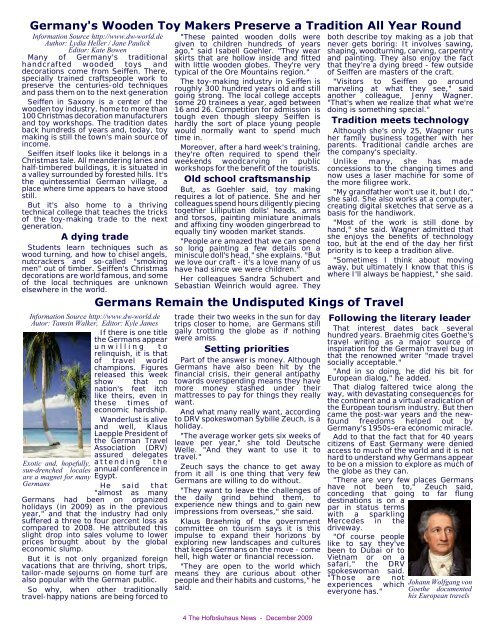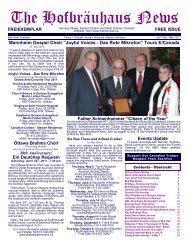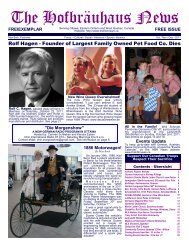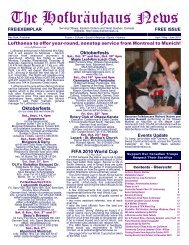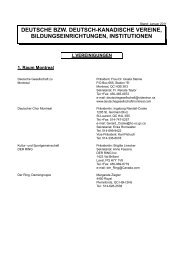Create successful ePaper yourself
Turn your PDF publications into a flip-book with our unique Google optimized e-Paper software.
Germany's Wooden Toy Makers Preserve a Tradition All Year Round<br />
Information Source http://www.dw-world.de<br />
Author: Lydia Heller / Jane Paulick<br />
Editor: Kate Bowen<br />
Many of Germany's traditional<br />
handcrafted wooded toys and<br />
decorations come from Seiffen. <strong>The</strong>re,<br />
specially trained craftspeople work to<br />
preserve the centuries-old techniques<br />
and pass them on to the next generation<br />
Seiffen in Saxony is a center of the<br />
wooden toy industry, home to more than<br />
100 Christmas decoration manufacturers<br />
and toy workshops. <strong>The</strong> tradition dates<br />
back hundreds of years and, today, toy<br />
making is still the town's main source of<br />
income.<br />
Seiffen itself looks like it belongs in a<br />
Christmas tale. All meandering lanes and<br />
half-timbered buildings, it is situated in<br />
a valley surrounded by forested hills. It's<br />
the quintessential German village, a<br />
place where time appears to have stood<br />
still.<br />
But it's also home to a thriving<br />
technical college that teaches the tricks<br />
of the toy-making trade to the next<br />
generation.<br />
A dying trade<br />
Students learn techniques such as<br />
wood turning, and how to chisel angels,<br />
nutcrackers and so-called "smoking<br />
men" out of timber. Seiffen's Christmas<br />
decorations are world famous, and some<br />
of the local techniques are unknown<br />
elsewhere in the world.<br />
Exotic and, hopefully,<br />
sun-drenched locales<br />
are a magnet for many<br />
Germans<br />
Germans Remain the Undisputed Kings of Travel<br />
Information Source http://www.dw-world.de<br />
Autor: Tamsin Walker, Editor: Kyle James<br />
If there is one title<br />
the Germans appear<br />
unwilling to<br />
relinquish, it is that<br />
of travel world<br />
champions. Figures<br />
released this week<br />
show that no<br />
nation's feet itch<br />
like theirs, even in<br />
these times of<br />
economic hardship.<br />
Wanderlust is alive<br />
and well, Klaus<br />
Laepple President of<br />
the German Travel<br />
Association (DRV)<br />
assured delegates<br />
a ttending the<br />
annual conference in<br />
Egypt.<br />
He said that<br />
"almost as many<br />
Germans had been on organized<br />
holidays (in 2009) as in the previous<br />
year," and that the industry had only<br />
suffered a three to four percent loss as<br />
compared to 2008. He attributed this<br />
slight drop into sales volume to lower<br />
prices brought about by the global<br />
economic slump.<br />
But it is not only organized foreign<br />
vacations that are thriving, short trips,<br />
tailor-made sejourns on home turf are<br />
also popular with the German public.<br />
So why, when other traditionally<br />
travel-happy nations are being forced to<br />
"<strong>The</strong>se painted wooden dolls were<br />
given to children hundreds of years<br />
ago," said Isabell Goehler. "<strong>The</strong>y wear<br />
skirts that are hollow inside and fitted<br />
with little wooden globes. <strong>The</strong>y're very<br />
typical of the Ore Mountains region."<br />
<strong>The</strong> toy-making industry in Seiffen is<br />
roughly 300 hundred years old and still<br />
going strong. <strong>The</strong> local college accepts<br />
some 20 trainees a year, aged between<br />
16 and 26. Competition for admission is<br />
tough even though sleepy Seiffen is<br />
hardly the sort of place young people<br />
would normally want to spend much<br />
time in.<br />
Moreover, after a hard week's training,<br />
they're often required to spend their<br />
weekends woodcarving in public<br />
workshops for the benefit of the tourists.<br />
Old school craftsmanship<br />
But, as Goehler said, toy making<br />
requires a lot of patience. She and her<br />
colleagues spend hours diligently piecing<br />
together Lilliputian dolls' heads, arms<br />
and torsos, painting miniature animals<br />
and affixing tiny wooden gingerbread to<br />
equally tiny wooden market stands.<br />
"People are amazed that we can spend<br />
so long painting a few details on a<br />
miniscule doll's head," she explains. "But<br />
we love our craft - it's a love many of us<br />
have had since we were children."<br />
Her colleagues Sandra Schubert and<br />
Sebastian Weinrich would agree. <strong>The</strong>y<br />
trade their two weeks in the sun for day<br />
trips closer to home, are Germans still<br />
gaily trotting the globe as if nothing<br />
were amiss.<br />
Setting priorities<br />
Part of the answer is money. Although<br />
Germans have also been hit by the<br />
financial crisis, their general antipathy<br />
towards overspending means they have<br />
more money stashed under their<br />
mattresses to pay for things they really<br />
want.<br />
And what many really want, according<br />
to DRV spokeswoman Sybille Zeuch, is a<br />
holiday.<br />
"<strong>The</strong> average worker gets six weeks of<br />
leave per year," she told Deutsche<br />
Welle. "And they want to use it to<br />
travel."<br />
Zeuch says the chance to get away<br />
from it all is one thing that very few<br />
Germans are willing to do without.<br />
"<strong>The</strong>y want to leave the challenges of<br />
the daily grind behind them, to<br />
experience new things and to gain new<br />
impressions from overseas," she said.<br />
Klaus Braehmig of the government<br />
committee on tourism says it is this<br />
impulse to expand their horizons by<br />
exploring new landscapes and cultures<br />
that keeps Germans on the move - come<br />
hell, high water or financial recession.<br />
"<strong>The</strong>y are open to the world which<br />
means they are curious about other<br />
people and their habits and customs," he<br />
said.<br />
4 <strong>The</strong> <strong>Hofbräuhaus</strong> <strong>News</strong> - December 2009<br />
both describe toy making as a job that<br />
never gets boring: It involves sawing,<br />
shaping, woodturning, carving, carpentry<br />
and painting. <strong>The</strong>y also enjoy the fact<br />
that they're a dying breed - few outside<br />
of Seiffen are masters of the craft.<br />
"Visitors to Seiffen go around<br />
marveling at what they see," said<br />
another colleague, Jenny Wagner.<br />
"That's when we realize that what we're<br />
doing is something special."<br />
Tradition meets technology<br />
Although she's only 25, Wagner runs<br />
her family business together with her<br />
parents. Traditional candle arches are<br />
the company's specialty.<br />
Unlike many, she has made<br />
concessions to the changing times and<br />
now uses a laser machine for some of<br />
the more filigree work.<br />
"My grandfather won't use it, but I do,"<br />
she said. She also works at a computer,<br />
creating digital sketches that serve as a<br />
basis for the handiwork.<br />
"Most of the work is still done by<br />
hand," she said. Wagner admitted that<br />
she enjoys the benefits of technology<br />
too, but at the end of the day her first<br />
priority is to keep a tradition alive.<br />
"Sometimes I think about moving<br />
away, but ultimately I know that this is<br />
where I'll always be happiest," she said.<br />
Following the literary leader<br />
That interest dates back several<br />
hundred years. Braehmig cites Goethe's<br />
travel writing as a major source of<br />
inspiration for the German travel bug in<br />
that the renowned writer "made travel<br />
socially acceptable."<br />
"And in so doing, he did his bit for<br />
European dialog," he added.<br />
That dialog faltered twice along the<br />
way, with devastating consequences for<br />
the continent and a virtual eradication of<br />
the European tourism industry. But then<br />
came the post-war years and the newfound<br />
freedoms helped out by<br />
Germany's 1950s-era economic miracle.<br />
Add to that the fact that for 40 years<br />
citizens of East Germany were denied<br />
access to much of the world and it is not<br />
hard to understand why Germans appear<br />
to be on a mission to explore as much of<br />
the globe as they can.<br />
"<strong>The</strong>re are very few places Germans<br />
have not been to," Zeuch said,<br />
conceding that going to far flung<br />
destinations is on a<br />
par in status terms<br />
with a sparkling<br />
Mercedes in the<br />
driveway.<br />
"Of course people<br />
like to say they've<br />
been to Dubai or to<br />
Vietnam or on a<br />
safari," the DRV<br />
spokeswoman said.<br />
"Those are not<br />
experiences which<br />
everyone has."<br />
Johann Wolfgang von<br />
Goethe documented<br />
his European travels


